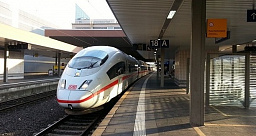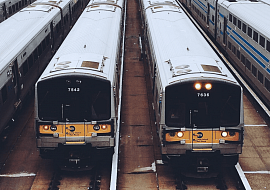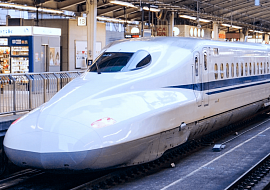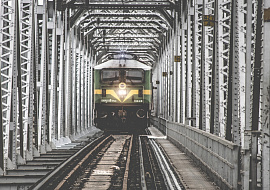How to Choose a Company Responsible for Rail Cybersecurity?
In cybersecurity, implementing protection measures proportionate to the risks is essential.
For rail systems, where infrastructure is intricately connected and the potential consequences of a cyber attack can be catastrophic, cybersecurity must be approached with precision and thoroughness. Effective security measures must safeguard both operational and corporate systems to ensure reliable and continuous protection.
As railways adopt open platforms, standardized hardware with ready-made parts, and interoperable control systems, the risk of cyberattacks escalates. Moreover, the rail industry is increasingly connected through the Internet of Things (IoT), cloud computing, and advanced communication technologies, making cybersecurity a critical priority for operators. Securing next-generation rail systems demands comprehensive expertise — encompassing cybersecurity, safety-critical equipment, regulatory compliance, connected environments, and cloud deployment. And this scope only continues to expand as technology evolves.
With technology evolving at a breakneck pace, managing rail cybersecurity is becoming more complex day by day. It’s crucial to know how to select the right cybersecurity partner — a trusted developer or integrator who can deliver robust, adaptive solutions to meet these challenges. Below, PSA rail signaling provider considers the vital criteria for the cybersecurity provider to navigate the ever-changing cybersecurity environment.
Expertise in Rail Cybersecurity
Cybersecurity solutions for railways must transcend generic protection strategies to prevent unauthorized access — whether through remote attacks over the internet, direct hacking of infrastructure, or local penetration. Rail systems are complex, integrating a variety of technologies such as signaling systems, communication networks, and connected devices, each with its unique vulnerabilities. To mitigate these risks, it's crucial to partner with a company that possesses deep, specialized expertise in securing rail networks, and adheres to industry standards like SIL (Safety Integrity Level) and Positive Train Control (PTC). This expertise is vital for implementing best practices, such as network segmentation between passenger services and critical signaling operations.
Effective rail cybersecurity must also account for the interconnectivity of various subsystems, including wayside signaling, dispatching, and onboard controls. A reliable provider will have the technical knowledge to secure interfaces across both single-vendor solutions and multi-vendor environments. This comprehensive approach ensures that all components — regardless of their origin — are protected from emerging threats, providing a robust, end-to-end security framework for the entire rail network.
Proven Track Record and Experience in Rail Cybersecurity
When evaluating rail cybersecurity providers, experience matters. Companies that have successfully implemented secure rail networks have the necessary insights to tackle the complexities of railway systems. You want to partner with a firm that has a proven track record of delivering full-cycle solutions – from system design to testing and deployment. This ensures they not only understand the threats but also know how to mitigate them effectively. Look for references or case studies that highlight their experience in securing critical systems, such as securing wayside systems and providing end-to-end encryption for communications between trains and ground.
Equally important is ensuring the company’s expertise aligns with your specific needs. Make sure that a company has end-to-end development projects in your areas of interest in their track list. Check out their experience in the design, development, and testing of signaling, interlocking products, or dispatching systems. This ensures they have a deep understanding of rail operations from within, enabling them to tailor a cybersecurity solution that meets the unique demands of your current rail environment.
Comprehensive Capabilities in Rail Cybersecurity
A cybersecurity provider must deliver robust security measures to safeguard physical and digital assets alike. They should demonstrate expertise in securing data transfer over signaling systems, including train-to-ground communication, and corporate systems by implementing protective measures that detect and prevent unauthorized transmissions. Additionally, they must restrict data transmission to authorized channels only. A comprehensive service offering — including encryption, secure communication channels, intrusion detection systems, and real-time monitoring — is essential to address the full spectrum of cybersecurity needs in the rail industry.
To ensure comprehensive and sustainable cybersecurity, a provider must offer a full attack management cycle, beginning with a system design that integrates rail cybersecurity from the ground up. This involves following industry best practices and building systems with modernization and long-term maintenance in mind to be reflected in product specifications. Security protocols such as TCP/IP and Modbus should be developed with built-in protection to minimize vulnerabilities in every network component.
Given the real-time nature of rail operations, the cybersecurity solution must rapidly identify and neutralize threats. Regular software and firmware updates are crucial to protect against emerging risks. In the event of an attack, the solution should be able to mitigate the impact and provide continuous monitoring for early warning signs. When it comes to software design, it’s critical that the provider adheres to recognized standards for secure development, incorporates threat simulations, and rigorously tests for potential vulnerabilities to minimize the attack surface.
Need Help with Rail Cybersecurity?
Focus on Compliance and Industry Standards for Rail Cybersecurity
Railway systems are covered by stringent regulations and standards, especially in regions like Europe, where ETCS (European Train Control System) requirements must be met. Any cybersecurity provider must demonstrate a clear understanding of these regulations and ensure that their solutions are fully compliant. They should offer optimized technical implementations for cyber measures taken by your company and suggest the most appropriate solution in case of controversial issues. Additionally, they must be capable of evaluating existing systems for vulnerabilities, ensuring they align with current standards.
Partnering with a provider that aligns with international security standards, such as ERTMS/ETCS for European rail networks, is essential for maintaining secure and compliant operations. For instance, PSA has developed encryption libraries that meet these standards, ensuring secure communications across rail networks while guaranteeing 100% uptime in operations.
Support for Legacy Systems and Future Scalability for Rail Cybersecurity
The rail industry operates with a blend of legacy and modern systems, a reality that will continue into the future. Your rail cybersecurity partner must have proven experience in integrating security protocols across both new and outdated infrastructures. At the same time, their solutions must be scalable as your network grows. For instance, the ability to integrate robust security measures into both microprocessor-based and relay-based signaling systems demonstrates the capacity to protect diverse technologies without compromising security.
Implementing a new or upgraded system should never weaken existing defenses or increase the attack surface vulnerable to exploitation. It’s crucial to ensure inter-system security, where protective measures are seamlessly integrated not only within systems but also at the interfaces between different systems — whether within a single organization or across multiple entities. Your rail cybersecurity provider must have the expertise to implement these safeguards across all touchpoints, ensuring comprehensive protection as your rail network evolves.
Customization and Tailored Solutions for Rail Cybersecurity
No two rail systems are identical. Look for a company that offers customized solutions tailored to the specific needs of your rail network. Off-the-shelf components for cybersecurity systems might not account for the unique vulnerabilities inherent in rail operations, so your rail cybersecurity provider should perform a detailed risk assessment to create a solution that fits your exact requirements or modernize the using products. It becomes vital for the system (even legacy) to receive firmware updates to fix issues or enable real-time monitoring and diagnostics to cover all the emerging security gaps.
When developing solutions from scratch, it’s critical for the new systems to incorporate device-to-device authentication, unauthorized access, and malware protection. These foundational elements ensure that the cybersecurity provider can offer comprehensive protection for your rail network’s evolving needs.
Post-Implementation Support and Long-Term Engagement for Rail Cybersecurity
As rail systems are continuously updated, cybersecurity is not a one-time project—it requires ongoing maintenance to ensure peak performance and protection. This demands continuous monitoring, regular updates, and proactive support to ensure that system modernization doesn't introduce new vulnerabilities. It is essential to choose a cybersecurity partner that offers long-term support and post-implementation services, including regular system audits, comprehensive testing, vulnerability assessments, and emergency response in the event of a breach.
For long-term rail cybersecurity success, partnering with a provider that values lasting relationships is key. Companies like PSA, known for their commitment to ongoing support and ability to scale teams as needed, ensure that your rail operations remain secure and resilient over time.
Rail Cybersecurity with PSA
Choosing the right rail cybersecurity provider for your rail network is not a decision to be taken lightly. Neither railway nor cybersecurity expertise should be compromised when considering such a partner. PSA development projects in the cybersecurity domain are sharpened to comply with your unique measures, providing deep industry experience, proven results in securing rail systems, compliance with regulatory standards, and the ability to offer tailored scalable solutions.
By partnering with PSA, you trust a reliable partner who:
-
Has patented cybersecurity technology, offering simple yet highly secure passwordless authentication through a full-duplex method;
-
Brings extensive experience in securing safety-critical communications between train and ground systems;
-
Possesses long-term expertise in the development and support of vital interlocking products, ensuring seamless interstation communication;
-
Specializes in the modernization of signaling systems for major rail networks worldwide.
With the right partner, you can ensure your rail operations are secure, resilient, and future-ready — protecting your infrastructure from evolving cyber threats while keeping your network secure and passengers safe.















